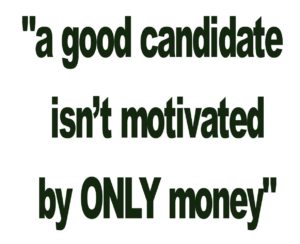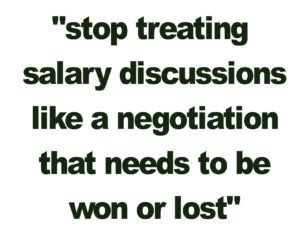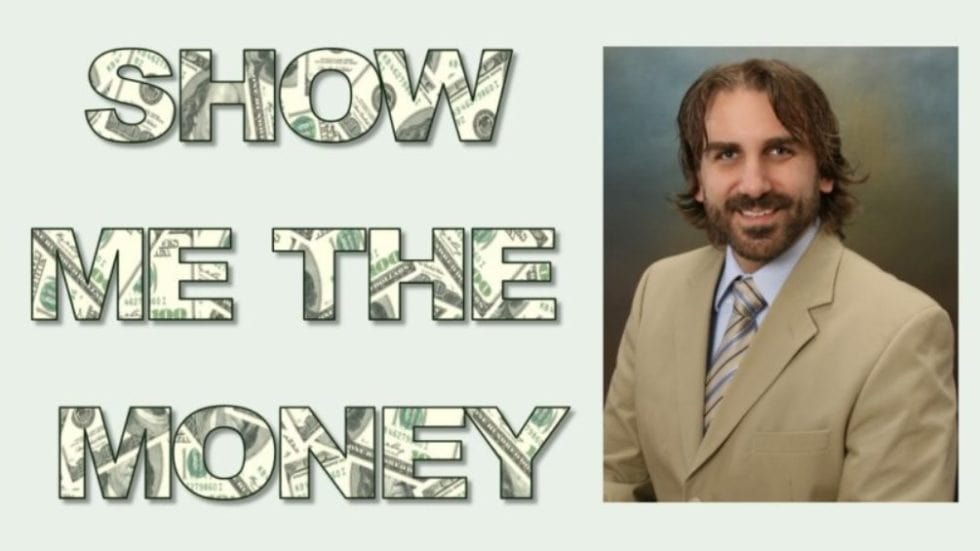by Gregg Podolski
Vice President, Direct Hire Division
I talk about money with candidates within the first three minutes of our initial conversation. This is antithetical to common recruiting practices, but that philosophy never made any sense to me. Just like the cost of an item is a big factor in my decision to buy it, so too has salary played a major role in every job offer I’ve ever entertained. Doesn’t make me a greedy, money-hungry job hopper—just makes me someone with bills to pay and kids to feed. It’s such an easy conversation, too, that it’s mind-boggling so many recruiters dance around it.
Goes something like this:
Before we get too far with the position I called you about, I just want to confirm that it makes sense for you financially. What kind of salary are you looking for?”
Then, regardless of what they say, I follow up with:
“Okay, this one pays X.”
If X is lower than the number they quoted, I say: “Still want to talk, or would that just not work?”
If X is higher, then I say: “No guarantee my client will go that high as it all depends on experience, but at least we know they can afford you.
”Then, depending on if they’re still interested, we talk about the position. This happens with literally every conversation I have with a first-time candidate.
So, why all the drama around salary? Why are candidates so hesitant to give a number, and why do companies/recruiters avoid the topic like a politician avoiding a lie detector? Because when it comes to salary, both sides fall victim to acting based on a handful of assumptions that are misguided at best, and downright wrong at worst. Let’s examine.
Assumption #1: Talking about salary too early in the process can cause a candidate to be disqualified for being too high or can cost them money if they’re too low.
Reality: Just because you tell a recruiter/hiring manager that you’re looking for $50k doesn’t mean you are now married to that number throughout the entire process. Part of every debrief I have with a candidate—which is done after every interview—is to evaluate their thoughts about the opportunity at that time. This includes asking them if the salary they told me during our first conversation is still the salary they would accept should we get to an offer. Sometimes a candidate sees and hears first hand the challenges of the role and decides their original number is too low for what they’d be asked to do. Other times they find that they love the company so much—due to culture, benefits, work/life balance, commute, etc.—that they’d be willing to accept less just for a chance to work there. The point is that by continuing to talk openly about salary throughout the process, a candidate will never lock themselves in to a number that is no longer in line with the actual opportunity.
Assumption #2: If the company quotes a salary too early, then they could wind up paying more than they need to for a candidate who would accept less.
 Reality: Yeah, maybe. But so what? If you get to the offer stage with a candidate and decide that person is the one who will be the difference-maker for your organization, then does it really matter if you could have saved $10k on them per year? As long as the number you say up front is within the budgeted range for the role, who cares if they would have accepted less? Aren’t they worth it to bring the type of value to the role that you believe they will bring? And more importantly, is low-balling someone like that just to save $200 or less per week really the way to start off what you hope will be a relationship built on mutual trust and respect?
Reality: Yeah, maybe. But so what? If you get to the offer stage with a candidate and decide that person is the one who will be the difference-maker for your organization, then does it really matter if you could have saved $10k on them per year? As long as the number you say up front is within the budgeted range for the role, who cares if they would have accepted less? Aren’t they worth it to bring the type of value to the role that you believe they will bring? And more importantly, is low-balling someone like that just to save $200 or less per week really the way to start off what you hope will be a relationship built on mutual trust and respect?
Assumption #3: A “good” candidate isn’t motivated by money, so it shouldn’t be discussed before going over other details of the job.
Reality: A good candidate isn’t motivated by ONLY money. While it’s true that someone who’s just chasing a bigger paycheck is more likely to be recruited away by an even higher paycheck, it’s by no means a guarantee. Further, to assume that money shouldn’t factor into the equation at all is just naïve.
Assumption #4: Company culture, growth potential and other perks should be enough to entice someone to accept less money than they want.

Reality: Come on, man. Can those things factor in to a decision to accept less? Sure, just see Reality #1. But unless culture, growth potential and other perks pay my electric bill, I’d rather hear about the money up front, thanks. Just put it on the table and THEN ask if they’re willing to continue the discussion so you can go over all the other fringe benefits with them. They might say yes. And if they don’t, then they probably weren’t going to accept less money anyway.

Like anything else, this all comes down to communication. Stop treating salary discussions like a negotiation that needs to be won or lost and start treating it like a rational, level-headed discussion about a key aspect of the job. Then sit back and watch how much easier it gets for everyone involved.
Gregg Podolski, is the Vice President of Emerson Group’s Direct Hire division. Gregg works on positions in all industries including C-Level Suite, Sales, Account Management, IT and Manufacturing/Operations/Project Managers.
#ProfessionalSearch #EmersonGroup #Salary #Retention
